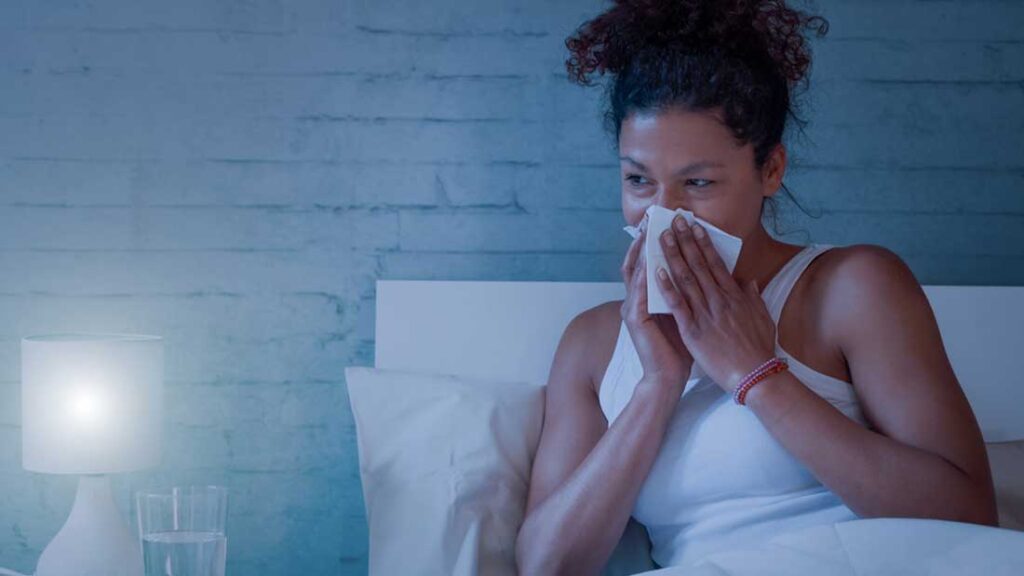
Although a warmer winter seems like a nice idea, this year’s unseasonably higher temperatures (thanks, global warming) combined with a wet climate have led to an early start of the growing season for plants, giving them a longer time to mature — and so begins a premature allergy season.
According to the Asthma and Allergy Foundation of America (AAFA), about 25 percent of adults and 20 percent of children suffer from seasonal allergic rhinitis, commonly known as “hay fever,” and this percentage is on the rise. (1) Allergies can cause nasal congestion and exacerbate sleep disorders, making sleep infinitely more challenging — and the worse your allergies are, the more impaired your sleep is likely to be. But there are ways to cope with allergies and improve your sleep. (2, 3)
Allergy Season in 2024
This year, pollen counts were higher in many areas of the US much earlier than usual, reaching moderate levels even before the season typically starts in some areas. “Allergies are worse this year, particularly in areas of the country that received more rain than usual — Southern California, in particular, received a lot of rain and is now undergoing a superbloom with very high levels of pollen,” explains Dr. Brian Greenberg, an M.D., Allergy & Immunology with 1MD.
While a superbloom, considered a surge of blooming plant life all at once, has upsides, it means trouble for allergy sufferers. This year, wildflowers started blooming in February in some low-elevation areas of Southern California. But even in areas without this phenomenon, allergen levels are higher everywhere.
Even low levels of pollen can cause issues for allergy sufferers. Low pollen concentrations range from approximately 10 to 20 grains per cubic meter. Moderate symptoms occur at around 50 to 90 pollen grains per cubic meter, and severe symptoms at 80 to 90 pollen grains per cubic meter.
The AAFA has identified two primary reasons for the increase in the number of people suffering from allergies — an increase in carbon dioxide levels caused by climate change, leading to increased pollen production, and the preference for planting more “male” trees (which are wind-pollinating) over “female” ones (which bear fruit, seed, and nuts). Planting more male trees has led to a phenomenon called “botanical sexism,” resulting in more wind-pollinating trees and, consequently, more pollen in the air.
The following is a list of the top 10 most challenging places to live with seasonal allergies:
- Wichita, Kansas
- Virginia Beach, Virginia
- Greenville, South Carolina
- Dallas, Texas
- Oklahoma City, Oklahoma
- Tulsa, Oklahoma
- Richmond, Virginia
- Des Moines, Iowa
- Raleigh, North Carolina
- Fayetteville, Arkansas
How Allergies Affect Sleep
For people with allergies, this increase in pollen can make daily life miserable, particularly when trying to sleep. “Nasal congestion makes it difficult to breathe freely through the nose, itching and sneezing can wake someone frequently or make it difficult to sleep at all, and people with allergy-triggered asthma might get awakened by cough or trouble breathing,” says Dr. Greenberg.
Research shows that allergies significantly impact sleep quality and efficiency and increase the risks of dysfunctional sleep, such as insomnia and disordered breathing. As a result, this can also cause daytime dysfunctions, such as trouble waking up and sleepiness during the day.
Obstructive sleep apnea is particularly linked to higher likelihoods — almost three times the odds — of experiencing seasonal allergies, and there seems to be a two-way relationship between sleep disorders and allergy symptoms in general. Getting less than 6 hours of sleep per night has been shown to increase the risk of developing allergic sensitization compared to getting 7 to 8 hours. This is because insufficient sleep is linked to elevated sIgE levels, which refer to the concentrations of specific immunoglobulin E antibodies in the blood—a clear indicator of developing an allergic reaction.
Allergic rhinitis can increase airway resistance due to higher nasal resistance, which causes symptoms such as apnea and snoring. Over time, sleep apnea development becomes more likely. Studies show that increased levels of specific allergy-related cytokines are related to delayed and shorter rapid eye movement (REM) sleep, worsening sleep quality in people with sleep apnea.
What You Can Do
The key to getting on top of allergy season is to start early and keep on top of symptoms.
Preventative Measures
According to Dr. Greenberg, the first and most important thing to do for better sleep during allergy season is to take care of all of the home and bedroom maintenance usually recommended by allergists before the season even starts:
- Install a HEPA air purifier in the bedroom
- Use allergy-proof mattress and pillow encasements
- Practice frequent dusting, sweeping, and mopping
Also, it is crucial to take preventive medications well before the pollen season, including nasal steroids for the nose and inhaled corticosteroids for asthmatics who need them, says Dr. Greenberg.
Dr. Kara Wada, board-certified pediatric and adult allergy, immunology, and lifestyle medicine physician at Ohio State University and Wexner Medical Center, recommends using these medications often and starting early. “To proactively help manage allergy symptoms, I recommend taking your OTC antihistamine allergy medication two to four weeks before allergy season is in full swing. I often recommend a non-drowsy antihistamine like Allegra for everyday use for my patients,” she says. Always ask your doctor which over-the-counter medicines would work best for you.
During the Season
If preventative medication use isn’t cutting it, Dr. Greeberg recommends the judicious use of as-needed medication, including nasal antihistamines, oral antihistamines, and decongestants. “Nasal spray decongestants can be used, but the patient should be cautious not to use them for more than three days in a row, as they can cause a rebound and make things worse,” he warns.
Dr. Wada recommends a four-pronged approach to help manage allergies. Along with the preventative medication use, she suggests:
Minimize exposure: Shower after being outside to help rinse pollen from your skin and hair, and keep your windows closed during allergy season to keep pollen from entering the house.
Immunotherapy: Work with an allergist to tailor a treatment plan that addresses your unique situation, exploring options like immunotherapy for long-term relief, including sublingual and intralymphatic approaches, which can provide increased convenience and less risk of reactions.
Check pollen and pollution levels: Dr. Wada recommends using Allegra Airways to find real-time routes with less pollen and air pollutants for outdoor activities. The web-based tool uses hyperlocal data to help reduce your exposure to allergens.
And when all of this fails, Dr. Greenberg recommends patience. “The spring pollen period lasts for only several weeks, and then it stops, giving patients a chance to do all of the above before the next pollen spike toward the end of the summer,” he says.
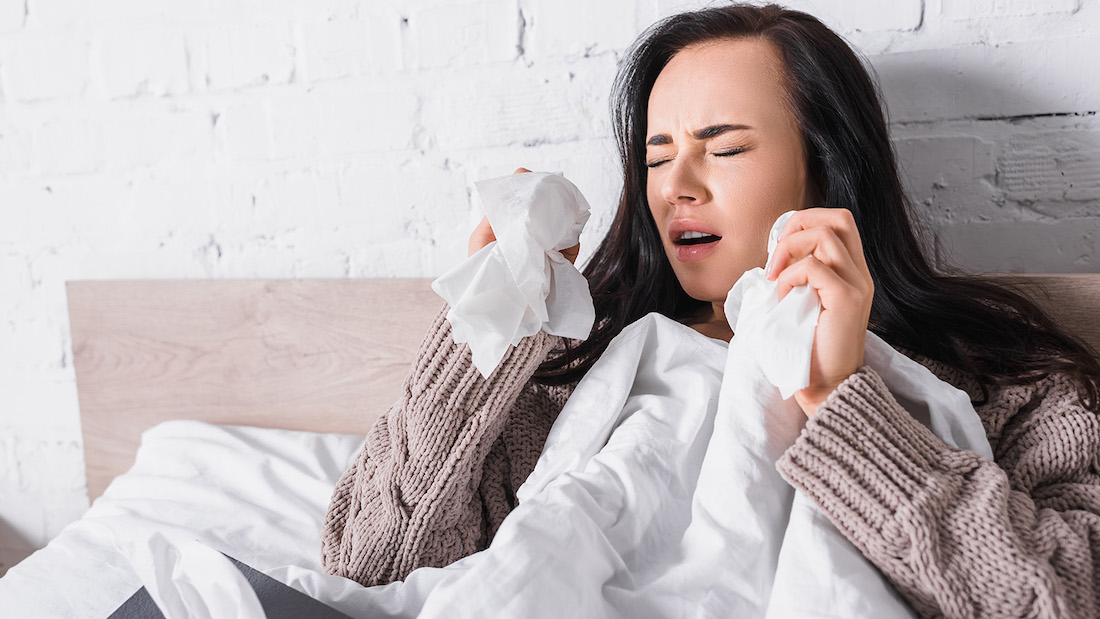
Can You Sneeze In Your Sleep? Here’s What the Experts Say.
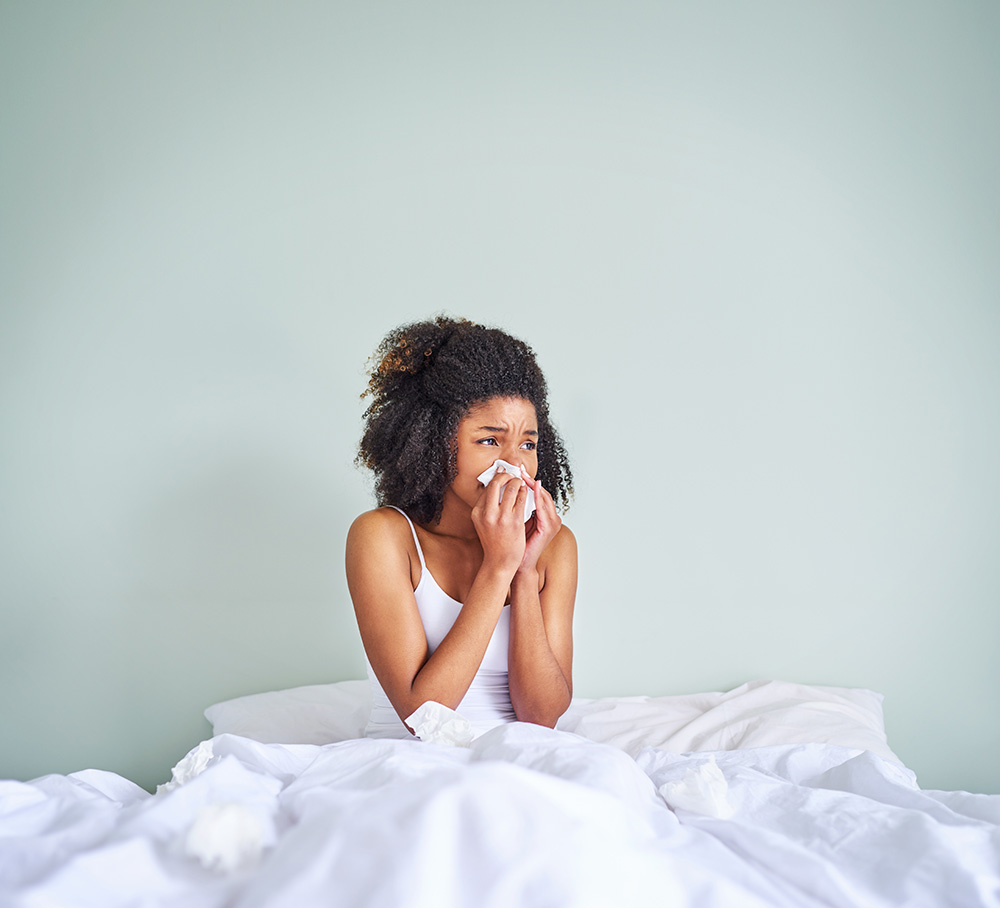
How To Sleep Better During Allergy Season
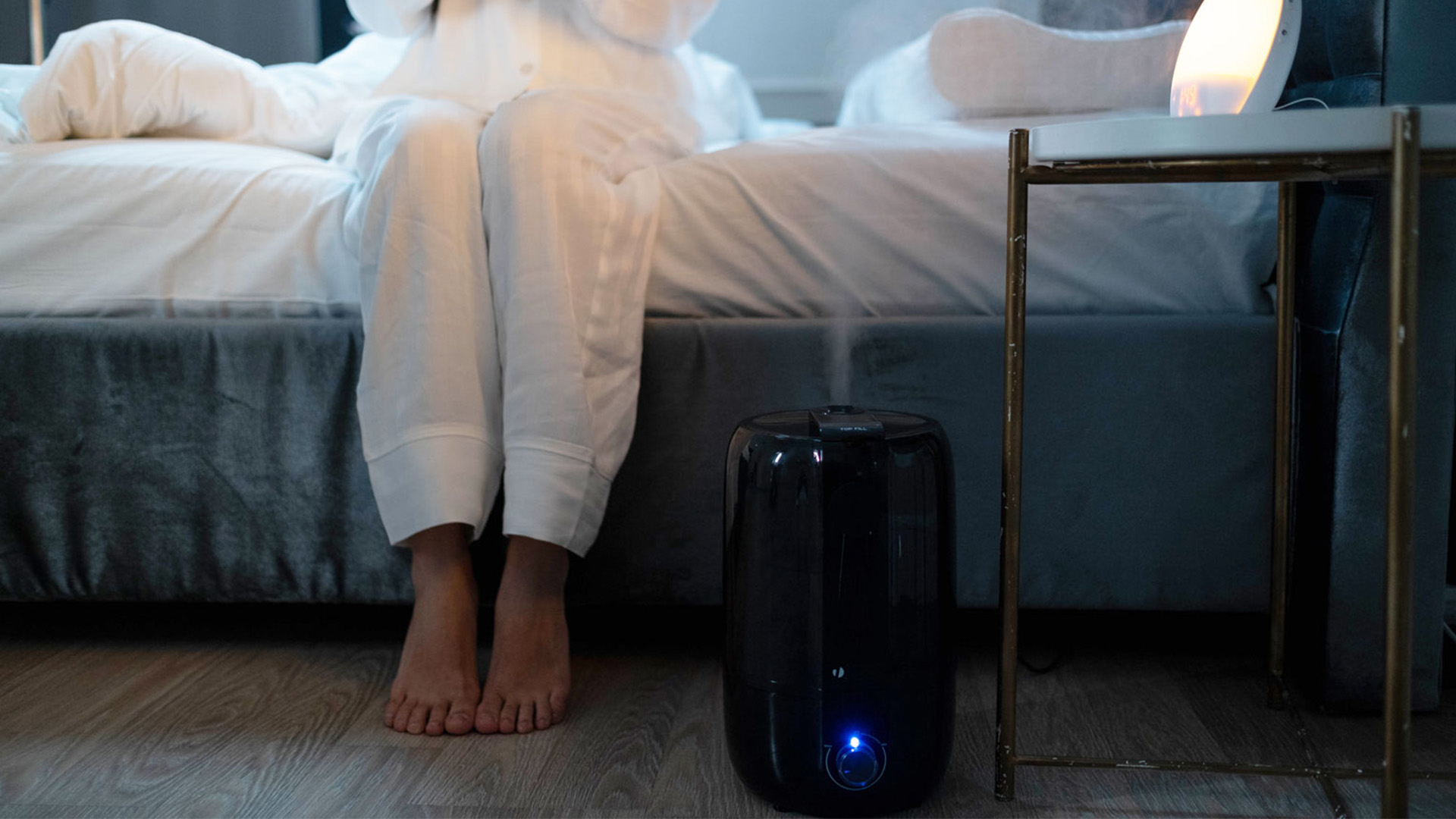
Here’s The Definitive Best Humidity Level For Sleeping
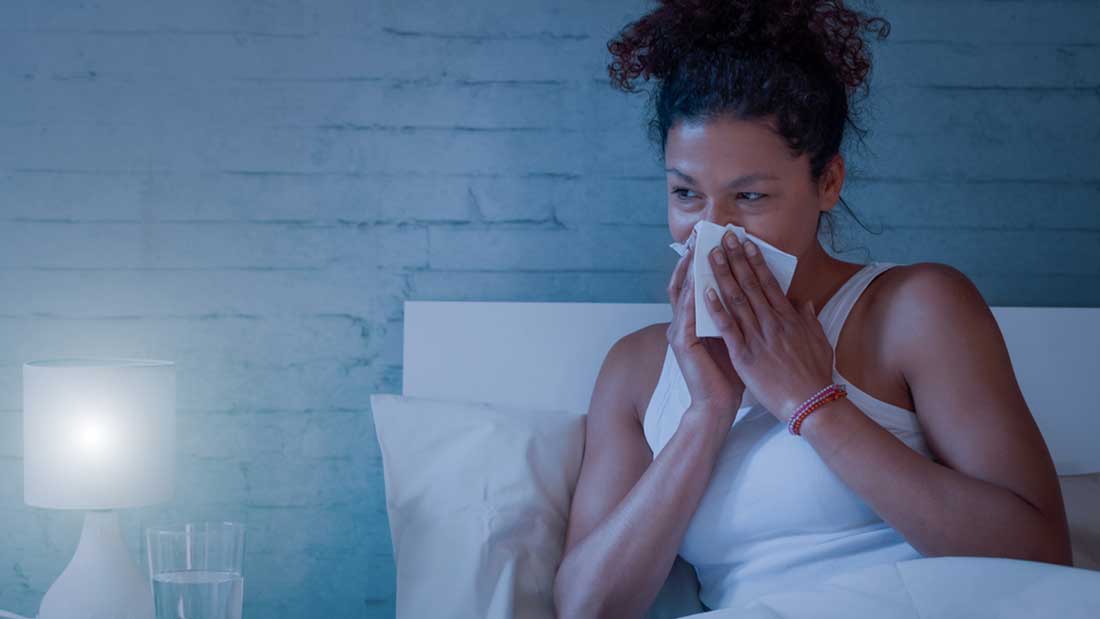
Why Are Allergies Worse At Night?
Sources
1. The Asthma and Allergy Foundation of America; “2024 Allergy Capitals Report Ranks the Most Challenging Cities to Live in with Seasonal Allergies,” AAFA; https://community.aafa.org/blog/2024-allergy-capitals-most-challenging-cities-seasonal-allergies; 2024.
2. Xi, Y., Deng, YQ., Chen, SM. et al. Allergy-related outcomes and sleep-related disorders in adults: a cross-sectional study based on NHANES 2005–2006. Allergy Asthma Clin Immunol 18, 27 (2022). https://doi.org/10.1186/s13223-022-00669-z; March 22, 2022.
3. Liu, Jiaomei; Zhang, Xinge; Zhao, Yingying; Wang, Yujiao. “The association between allergic rhinitis and sleep: A systematic review and meta-analysis of observational studies,” PLOS ONE; https://journals.plos.org/plosone/article?id=10.1371/journal.pone.0228533; February 13, 2020.
Greenberg, Brian. Author interview. April 2024.
Wada, Kara. Author interview. April 2024.